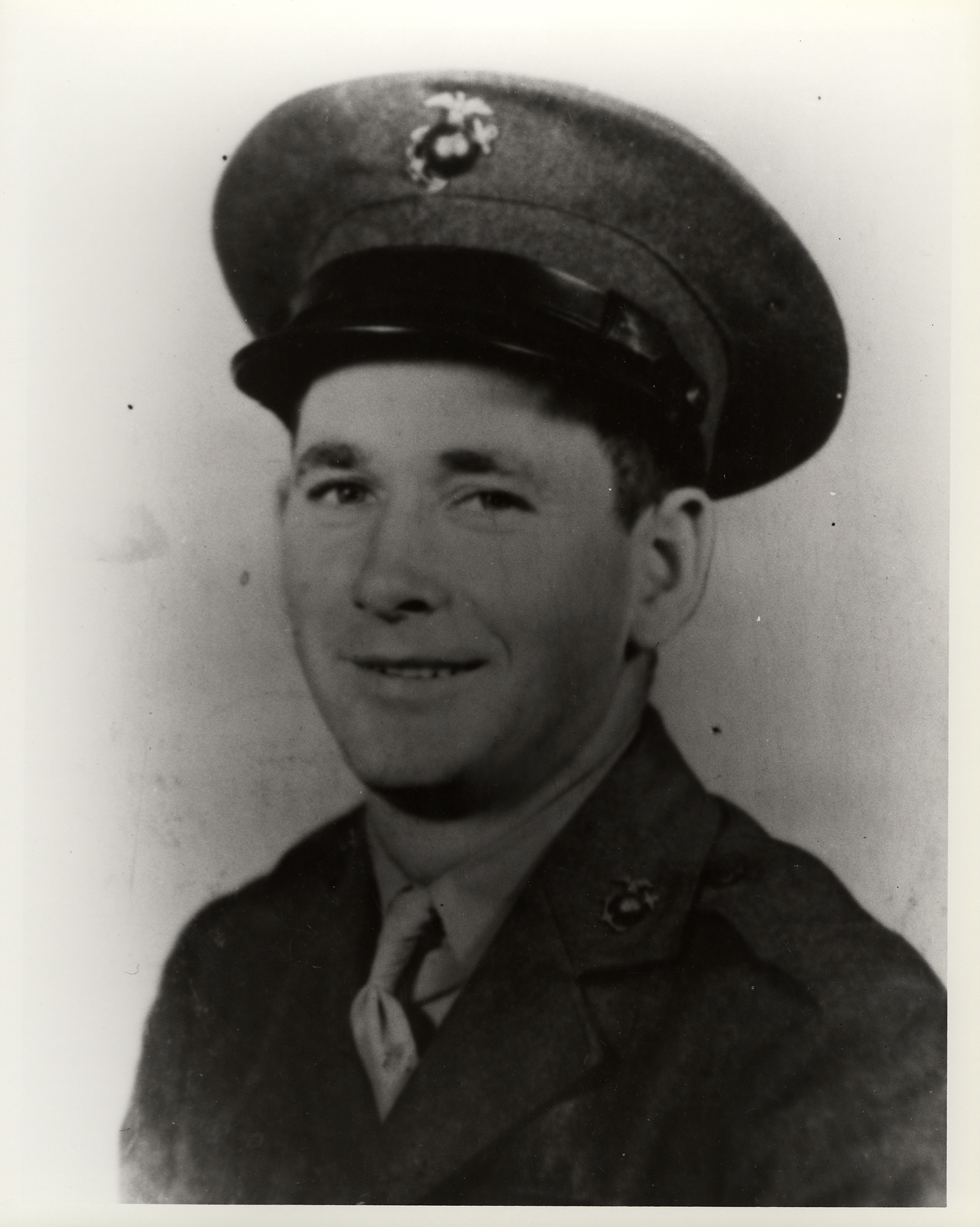
SERGEANT
ROSS F GRAY, USMCR (DECEASED)
Medal of Honor Citation
Ross Franklin Gray was born in Marvel Valley, Alabama, on 1 August 1920. He attended the elementary schools of Bibb County and went on to Centerville High School, which he left in 1939 after three years in attendance.
He went to work for his father as a carpenter. He had already worked at that trade part time for three years and now worked another three years before he enlisted in the Marine Corps Reserve. He played football and basketball at Centerville High and enjoyed hunting and fishing. He was a devout Protestant; in fact, his buddies in the Marine Corps called him "The Deacon."
He enlisted in the Marine Corps Reserve in Birmingham, Alabama, on 22 July 1942, and was assigned to active duty the same day. After receiving his recruit training at Parris Island, South Carolina, he went to New River, North Carolina, and in September joined the 23d Marines, 4th Marine Division. Promoted to private first class in April 1943, he was transferred to Company A, 1st Battalion, 25th Marines, a month later.
Private First Class Gray left for overseas duty on 13 January 1944 and landed at Kwajalein in the Marshall Islands where he took part in the Roi-Namur campaign. He was made an engineering corporal in March and in June made another assault landing--this time at Saipan. At the conclusion of the fighting at Saipan, Cpl Gray took part in the landing on Tinian Island, also in the Marianas.
Promoted to sergeant in August, he attended the 4th Marine Division Mine and Booby Trap School, upon completion of which he was rated qualified to instruct troops in the laying of mine fields; the reconnaissance of enemy minefields, day and night; the location, neutralization, disarming, and removal of mines; the neutralization of booby-trapped mines; and the day and night clearance of lanes through minefields. Examined and found qualified for promotion to the rank of staff sergeant, Sgt Gray, due to the lack of openings for that rate in his organization was never promoted to the third pay grade.
On 21 February 1945, two days after D-Day on Iwo Jima, Sgt Gray was acting platoon sergeant of one of Company A's platoons which had been held up by a sudden barrage of Japanese hand grenades in the area northeast of Airfield No. 1. Promptly withdrawing his platoon out of range of the grenades, he moved forward to reconnoiter. He ascertained that the advance was held up by a series of enemy emplacements connected by covered communication trenches and fronted by a mine field.
Through a hail of enemy small arms fire, Sgt Gray cleared a path through the mine field up to the mouth of one of the fortifications, then returned to his own lines, where with three volunteers, he went back to the battalion dump and acquired twelve satchel charges. Placing these in a defilated area within his platoon he took one weighing twenty-four pounds, and covered by the three volunteers, advanced up the path he had cleared and threw the charge into the enemy position sealing it.
Immediately brought under fire from a machine gun in another opening of the same position, Sgt Gray returned to the defilated spot, obtained another charge, returned to the position and completely destroyed it. Spotting another emplacement, he went through the mine field for the seventh and eighth time to get another charge and destroy another enemy stronghold.
He continued this one-man attack, all the time under heavy small arms fire and grenade barrage, until he had destroyed six enemy positions. At one time a Japanese grenade landed so close to him that it blew his helmet off. Throughout, he went unarmed so that he could more easily carry the charges and accessories.
When he had eliminated the six positions, Sgt Gray disarmed the whole mine field before returning to his platoon.
Although he remained unscratched through his twelve trips back and forth among enemy mines, constantly under heavy fire, Sgt Gray was killed six days later, on 27 February 1945, by an enemy shell which inflicted fatal wounds in his legs.
For his personal valor, daring tactics, and tenacious perseverance in the face of extreme peril on 21 February, Sgt Gray was posthumously awarded the Medal of Honor by President Harry S. Truman.
The coveted award was presented to the hero's father by Rear Admiral A. S. Merrill, USN, then Commandant of the Eighth Naval District, at the football field at Centerville High School in the presence of the Governor of the State of Alabama, Chauncy Sparks, on 16 April 1946.
Sergeant Gray was initially buried in the 4th Marine Division Cemetery on Iwo Jima, but later his remains were returned to the United States for private burial in Woodstock, Alabama.
World War II 1941-1945 Medal of Honor